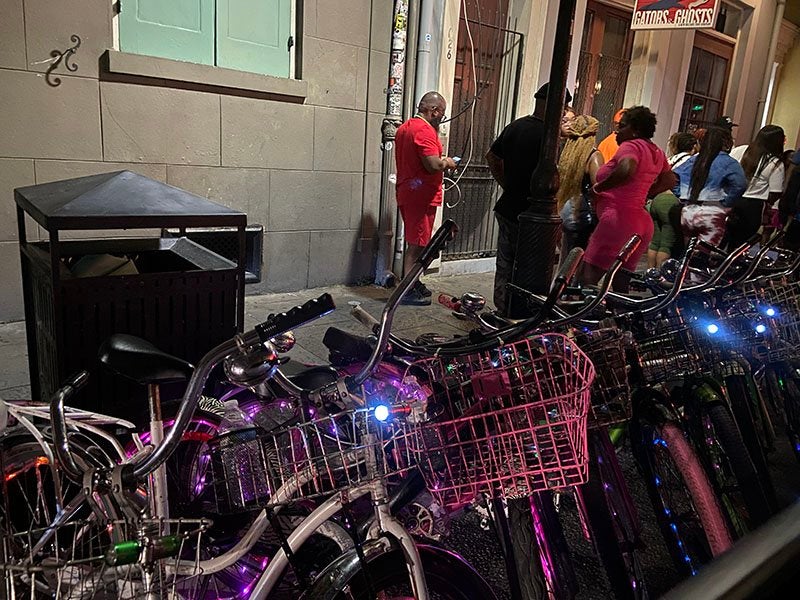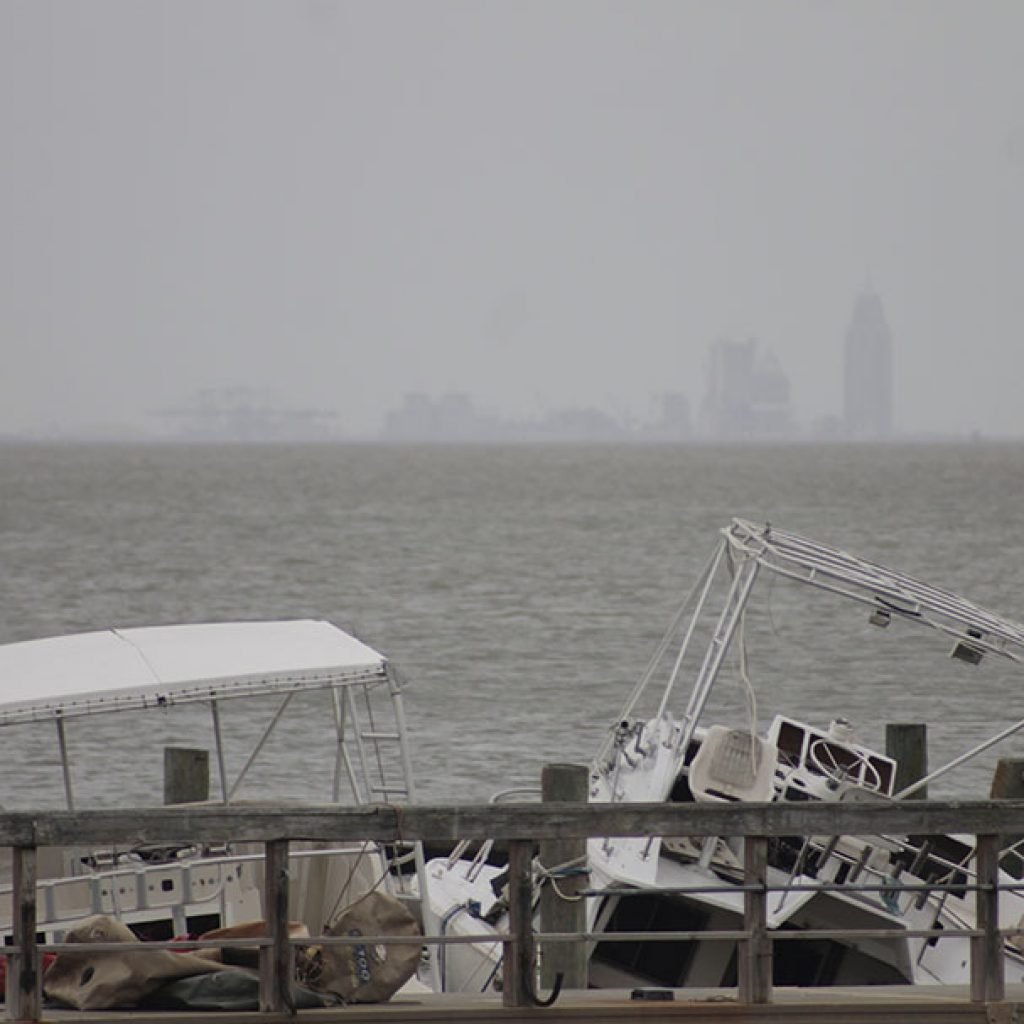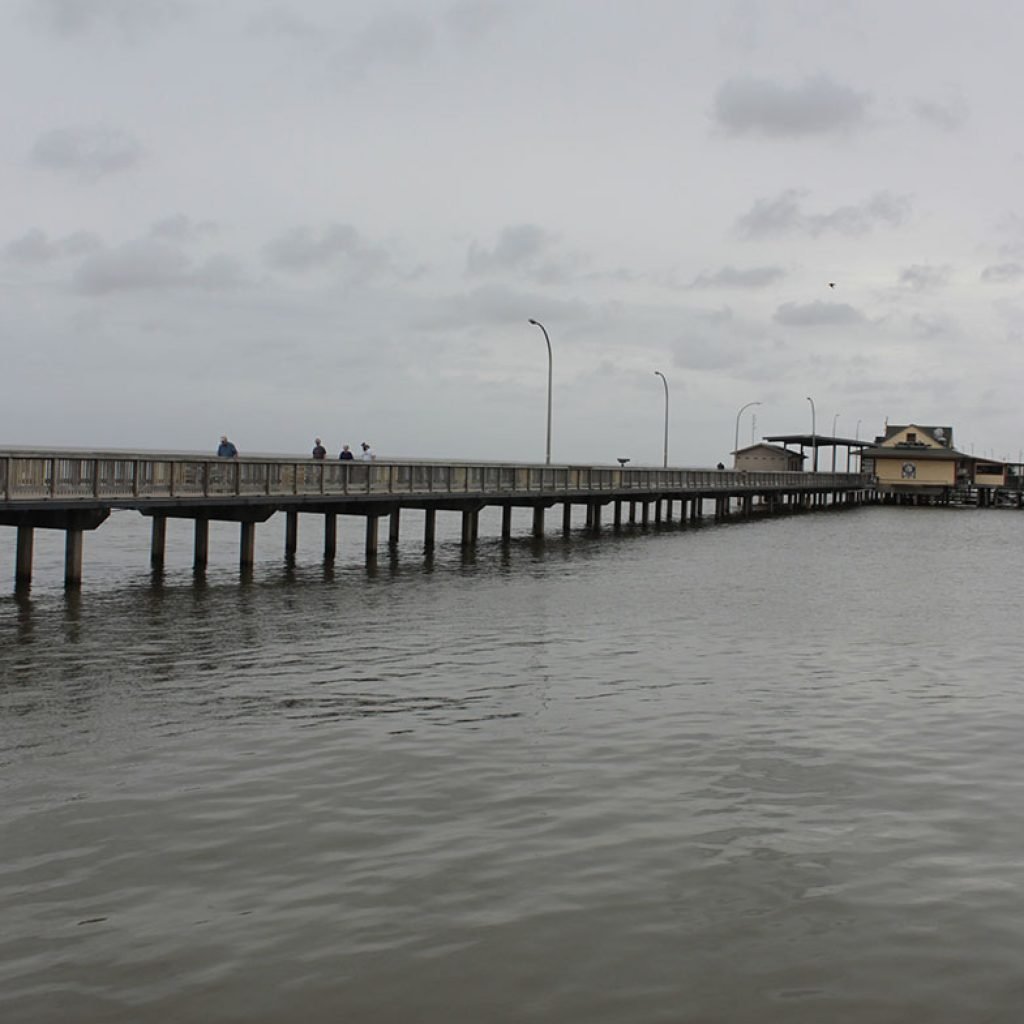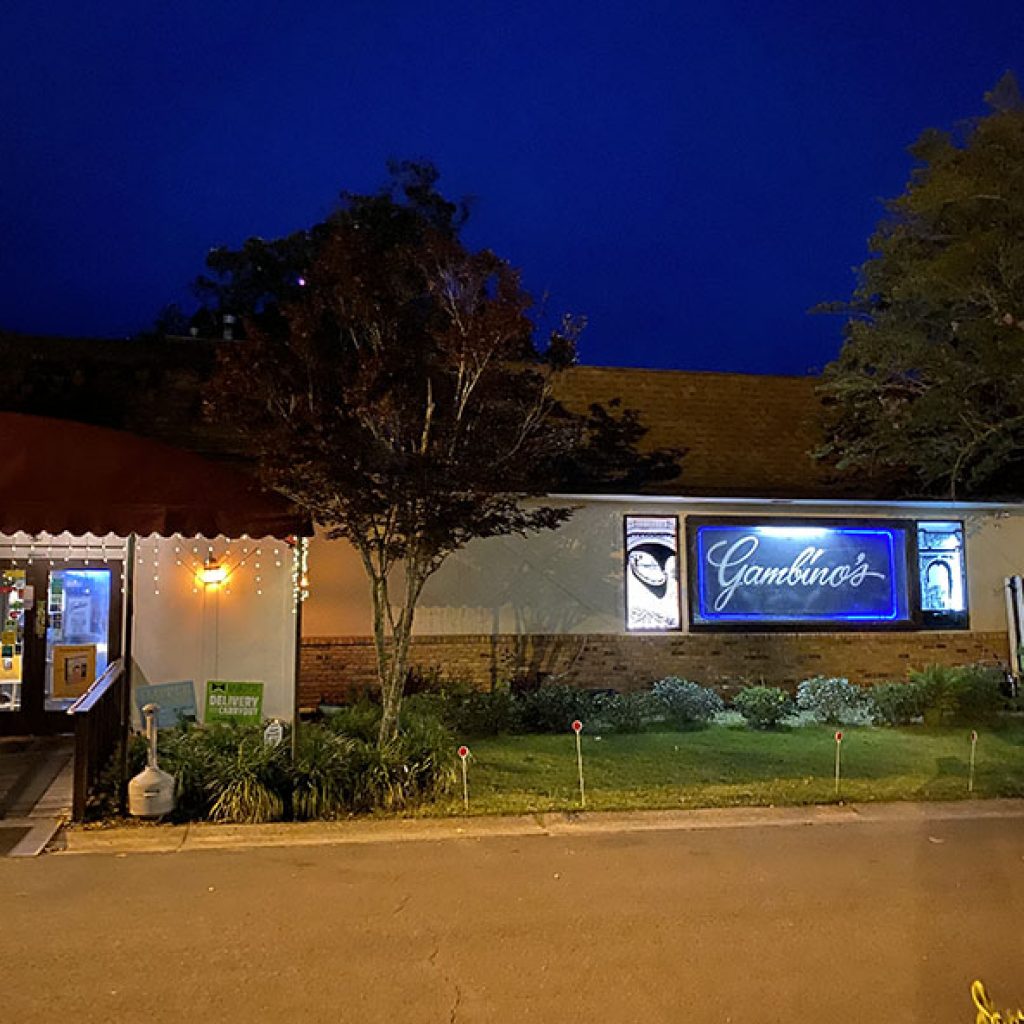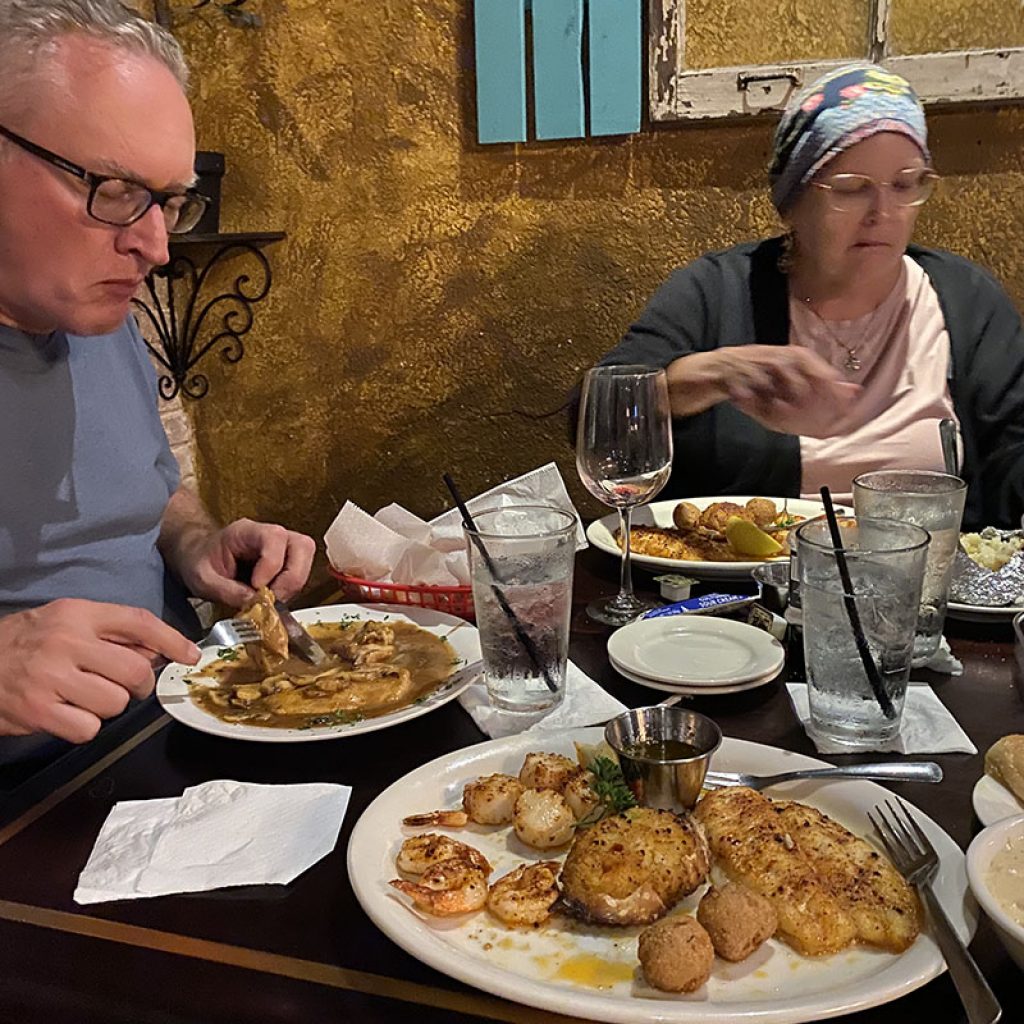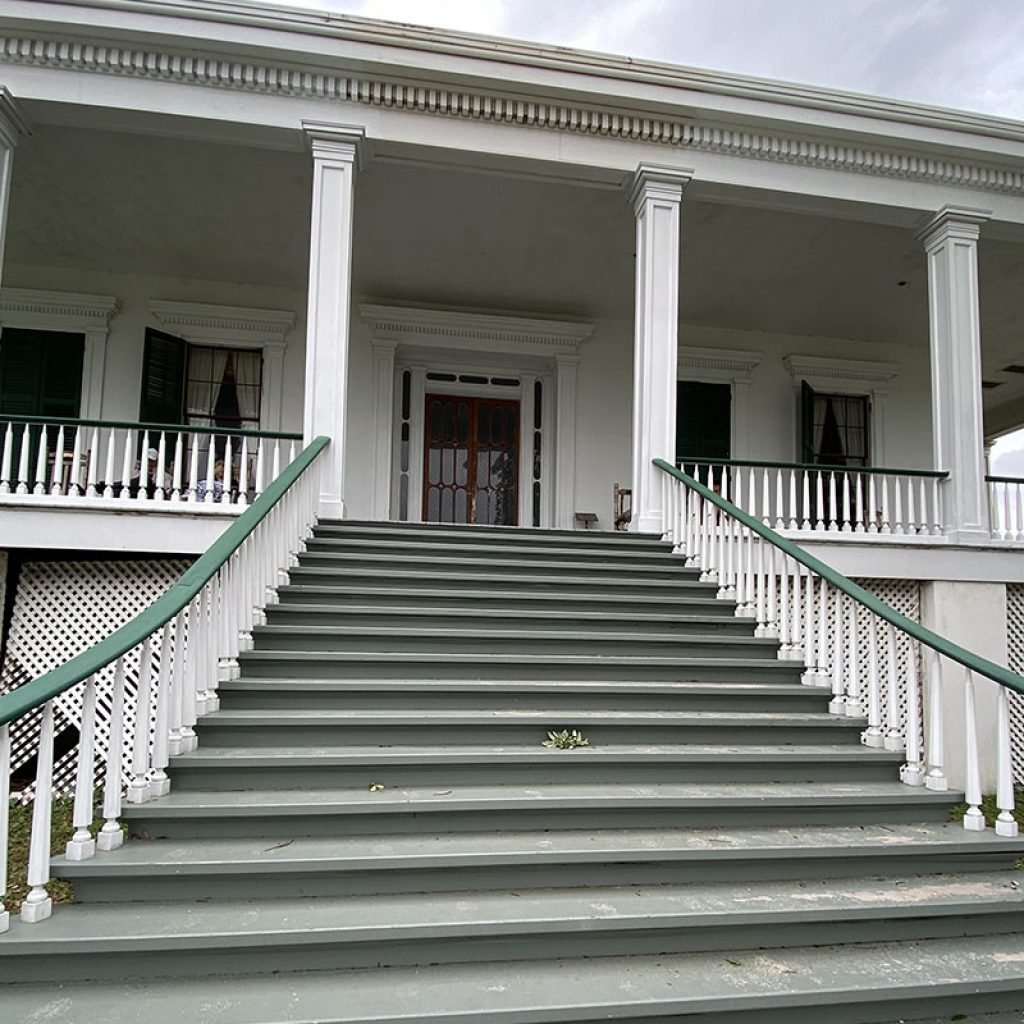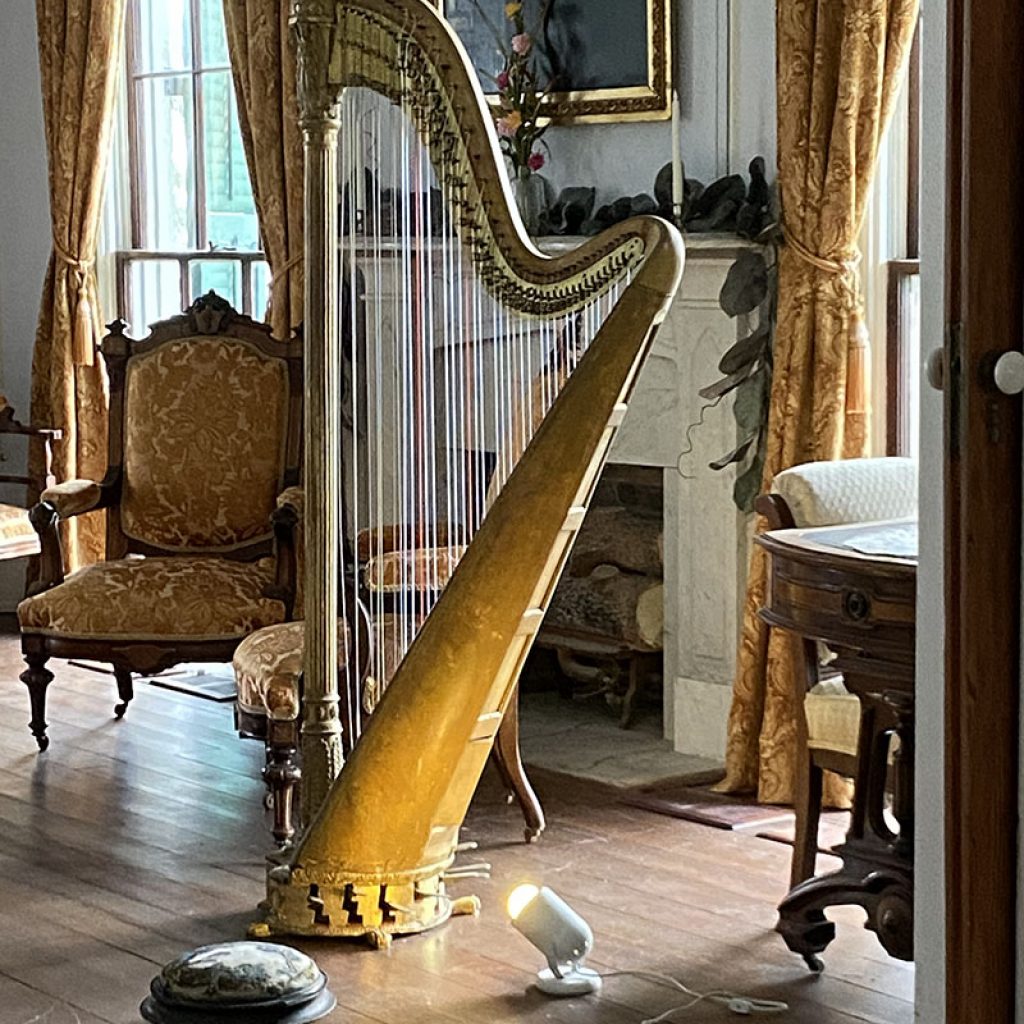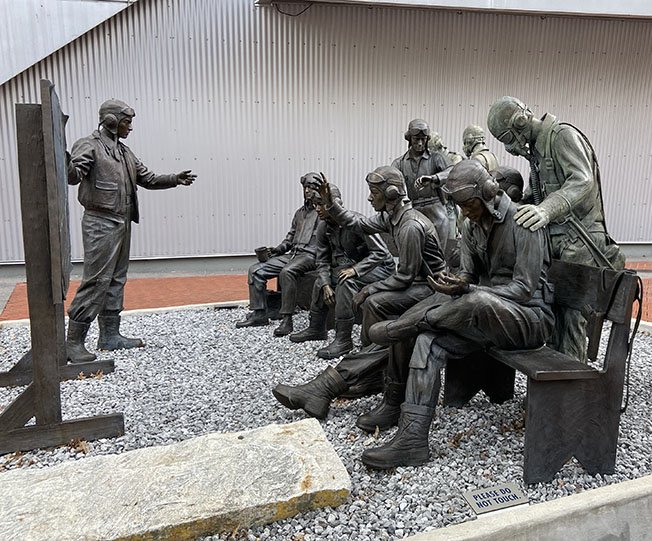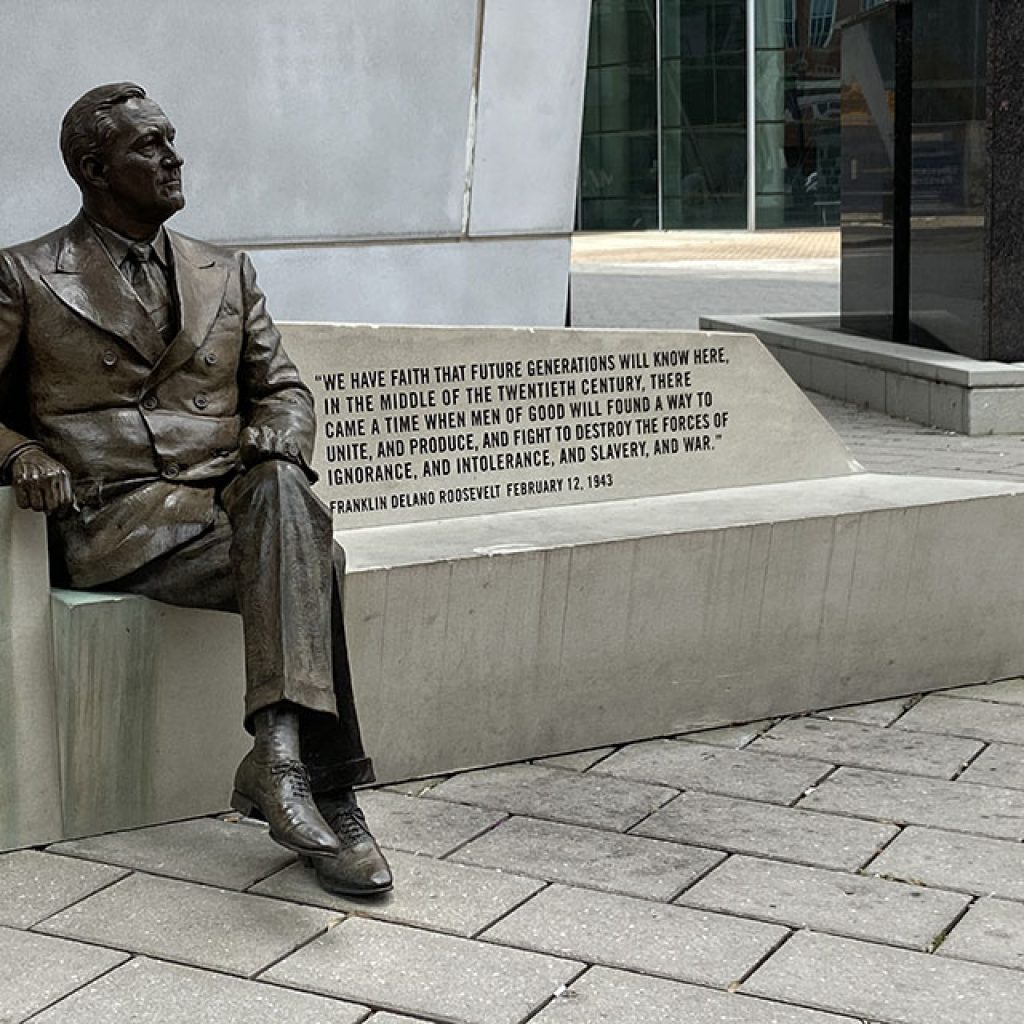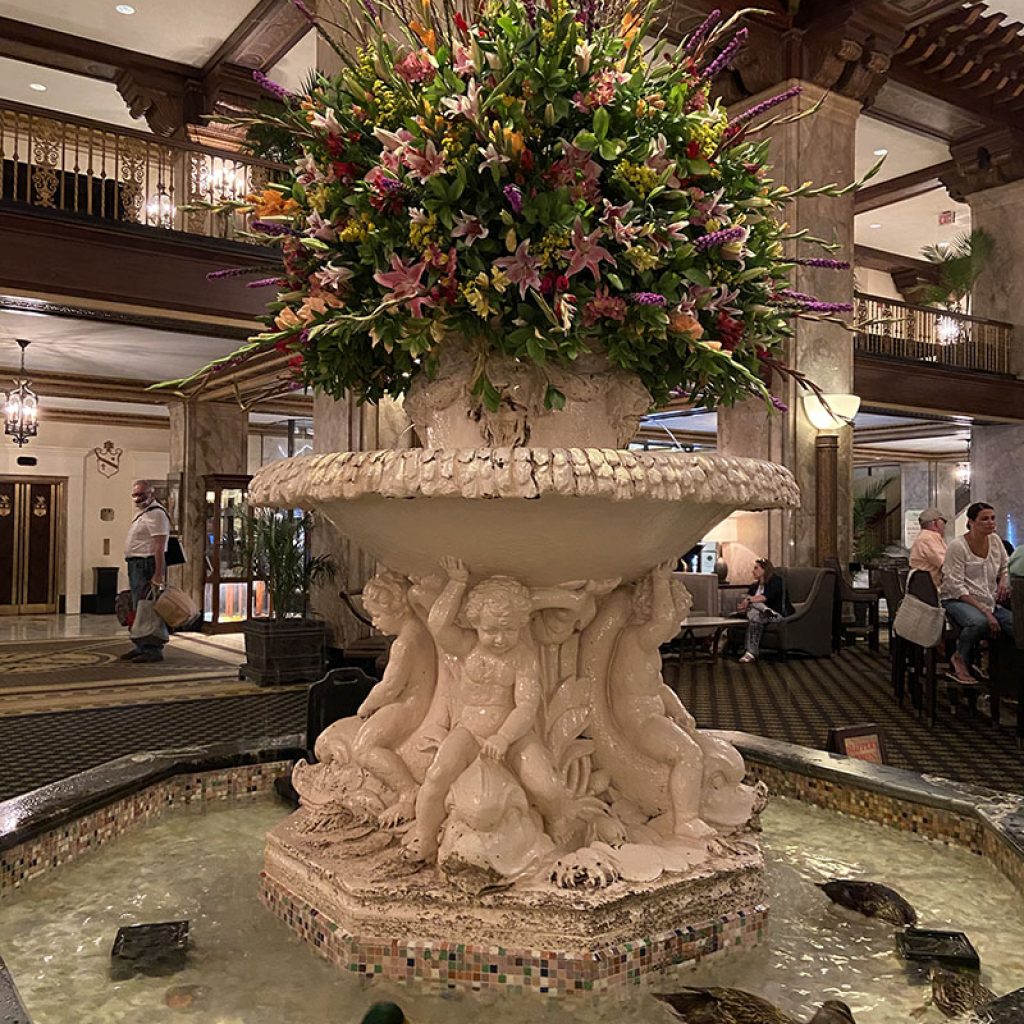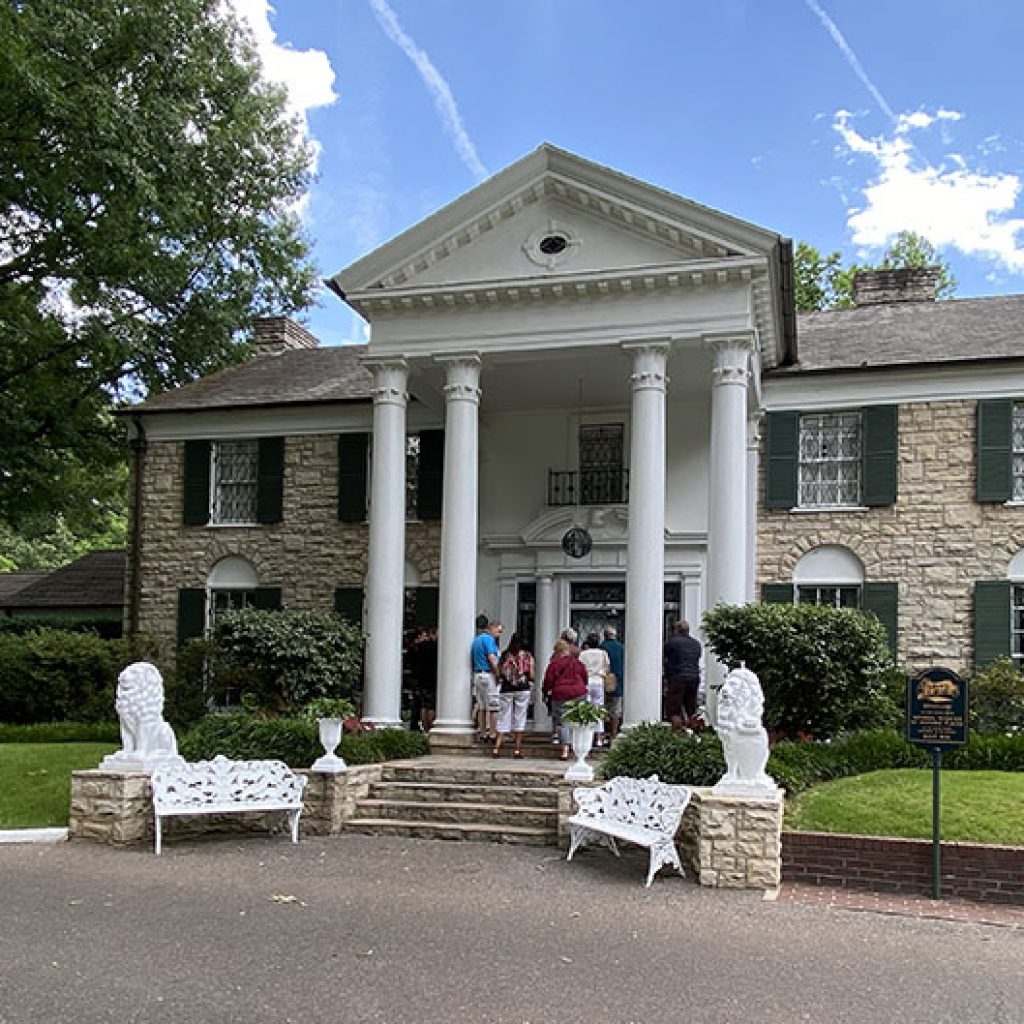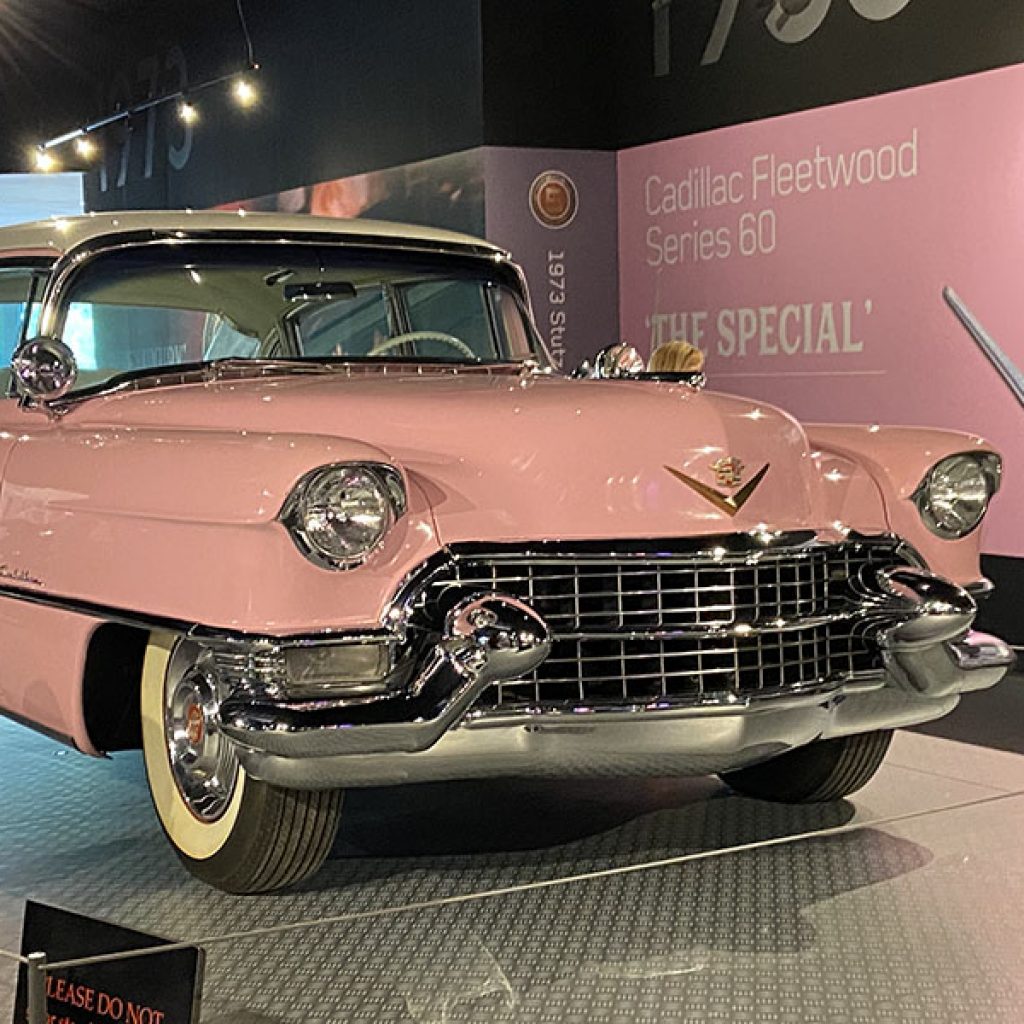Editor’s Note: Writer Debbie Reddin van Tuyll helps us celebrate National Road Trip Day by recounting her recent adventures on a road trip through the deep South.
There’s something magical about a road trip. I think it’s the alluring combination of no responsibilities and the potential for adventure.

Staff photo by Debbie Redding van Tuyll.
For the first time in many years, I got to experience that magic in mid-May with my husband Hubert and one of my oldest and very best friends, Lesa Howell.
Hubert and I retired from Augusta University at the end of the spring semester, and just a few days after graduation, we took off on a grand tour of the deep South.
For me, the motivation was mostly nostalgia. Among our other stops, we were planning to visit Fairhope, Ala., the utopian artist community where I had my first reporting job; Mobile, where I hadn’t been since my junior year in high school and New Orleans, one of my parents’ favorite haunts when I was a pre-teen and temporary home to Lesa’s husband Walter.
For a hint of adventure, we also planned a stop in Oxford, Miss., home of the University of Mississippi. I have a friend on the Mississippi faculty who also just retired, and I wanted to check on her. She hadn’t planned to retire just yet, but she was forced to take a medical retirement. That concerned me.
Our first stop was Lilburn, the northeastern Atlanta suburb where Lesa lives. Initially, the trip was planned to help Walter move back to Atlanta. He’s been teaching at a nursing school down there for the last three years, and he was planning to retire at the end of May, but rumors of a fall bonus started circulating, he decided to postpone retirement a bit. So, we were just going for a visit and to drop Lesa off for a few weeks.
MORE: Augustans Ready for Summer Travel
Once we loaded Lesa’s luggage in the car, we headed out. When our conversation turned to where to have lunch, I suggested Montgomery as a good stopping point. Hubert and I were there a few years ago, and what a transformation that city had made since our college days. Back then, the Alabama capital, known affectionately to state residents as Goat Hill, was dingy, dirty and dilapidated.
No more. Montgomery’s white marble buildings gleam in the unrelenting sunshine of central Alabama. Trendy restaurants dot the city, and the Alabama Riverfront has revitalized to a vibrant recreational area.
Because this trip was about nostalgia, we settled on lunch at Dreamland Bar-B-Q. Dreamland started out in Tuscaloosa, home of the University of Alabama. “Big Daddy” John Bishop started the chain back in 1958, so it’s a staple of Bama culture, just like the Greek machine at the university or Nicks in the Sticks, a fabulous and cheap steak restaurant an old gas station outside Eutaw, Ala.–pronounced like the state Utah.
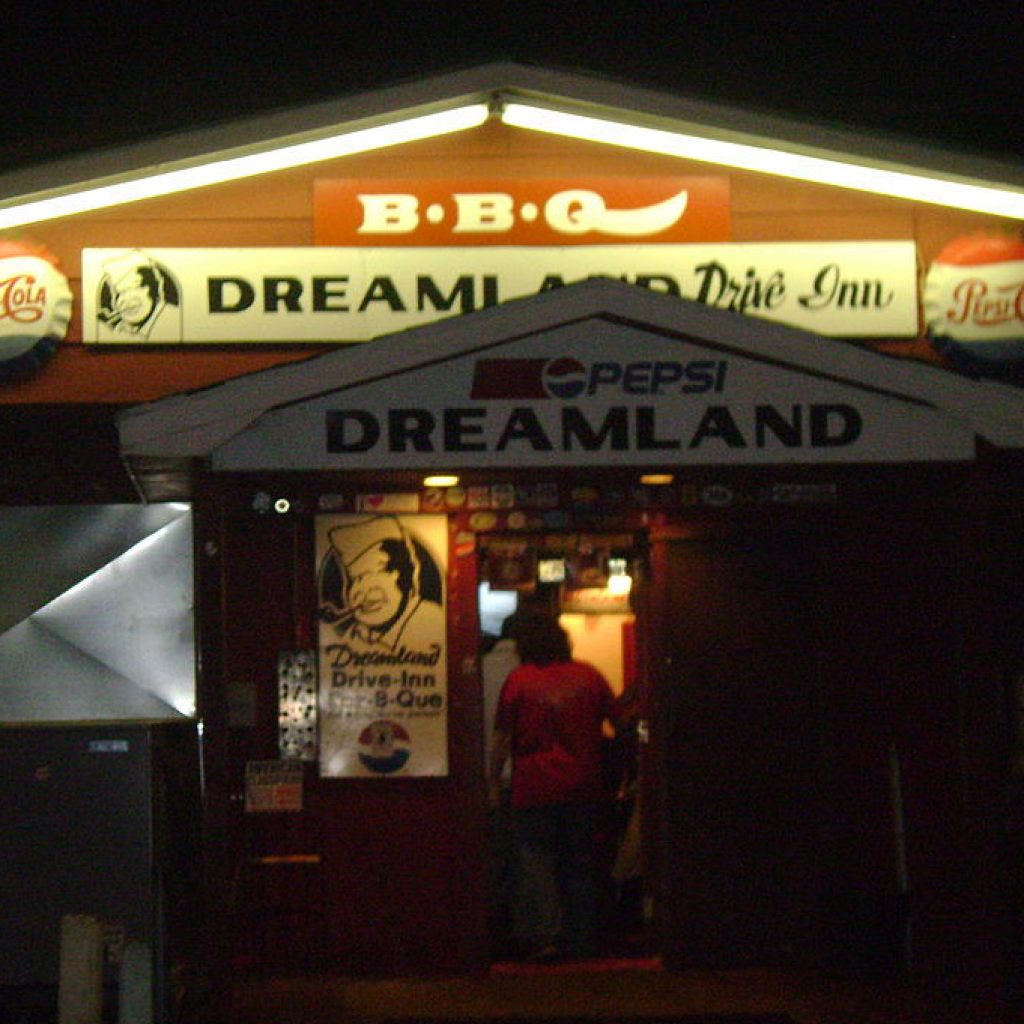
CH52584 at English Wikipedia, Public domain, via Wikimedia Commons
The original restaurant was T-town’s secret, known only to residents and University of Alabama students, until the last five years when franchises opened throughout Alabama, Georgia and Florida. I first visited the original Dreamland when I was a master’s student at Alabama. Today, it’s a chain of about 10 locations. The closest one to Augusta is in Duluth, Ga.
Dreamland is best known for their slow smoked ribs daubed with a sweet-hot and tangy tomato-based barbecue sauce. Given how messy ribs are, Lesa and Hubert opted for barbecue pork sandwiches, and I went for chicken. We weren’t disappointed. Both meats had that smoky under-flavor that’s a hallmark of really good barbecue, and the cole slaw was cold, creamy and tangy–perfect.
We rolled out of Dreamland after gorging on barbecue and sweet tea, piled back in the car and headed on to our final destination for the day: Baldwin County, Ala. My first job was at a weekly newspaper, the Robertsdale Independent. Robertsdale is a small town located in the agricultural heart of Baldwin County.
[adrotate banner=”54″]
Robertsdale was a county-wide paper (the other four in the county all only covered their hometowns), and I was assigned to cover the Eastern Shore, so I lived in Fairhope. Fairhope was, and is, an interesting place. The town was founded by the followers of Henry George, an economist and journalist, who believed that land should be owned jointly by all members of a community who could profit from what they produced from land but not the land itself. People who live in the old part of Fairhope own their homes but not the land on which they sit. That’s held in a kind of trust by the Single Tax Corporation.

Looking toward Mobile from the Fairhope pier. 
The Fairhope pier hasn’t changed in at least 40 years.
Fairhope has long since spread well beyond that old section, and it’s certainly not the sleepy little artist colony it was when I lived there in my un-airconditioned garage-turned-house on George Street — which seems not to exist any longer. We looked and looked and couldn’t find it. I couldn’t find the Winn Dixie, either. Or the town hall where I took donuts to secret meetings of the city council. The town has sprawled so much and so far. I had a realization that was both sobering and soothing: the town had changed and grown as much in the last 40 years as I have.
[adrotate banner=”31″]
Some things were still there, like the first restaurant I ever ate at, Gambino’s, even though it’s been remodeled. It’s an old-fashioned steak and seafood supper-club type restaurant right on the bay road that goes down to Point Clear. Exactly the same as it was when I moved to Fairhope. The biggest change was that the hotel it used to serve is no longer there. And the pier. It hasn’t changed at all. The night we walked the pier was misty, but we could make out the vague outline of Mobile across the bay.

Gambino’s Restaurant in Fairhope, Ala. 
Hubert and Debbie van Tuyll enjoyed a seafood dinner at Gambinos.
After a couple of days of re-exploring Baldwin County, we turned our sights to New Orleans via the Mississippi coastal road. I last drove that road when I was little and my mother and aunt took us kids over to Biloxi to see Beauvoir, Jefferson Davis’ last home. I don’t remember much about that trip except that we got caught in the outer bands of Hurricane Camille on the way home to Birmingham. For the sake of nostalgia, we decided to stop in at Beauvoir for a quick visit. The house was less spectacular than I remembered from my childhood, and the museum and library “read” differently now that I’ve spent the last 20 years writing about Southern journalism during the Civil War era. The most interesting thing in the house was the pedal harp Winnie Davis played.

Front steps at Beauvoir. 
Winnie Davis’ harp.
From Biloxi, we were only an hour from New Orleans. Hubert had never been to New Orleans, though I’d given him a chance nearly 20 years ago when we we driving home from Texas where we’d just gotten a new puppy. I offered to take I-10 so he could at least see the city, but the puppy was restive, and he said just to head on back to Augusta. A few weeks later, Hurricane Katrina hit. Parts of New Orleans still haven’t recovered.
As we crossed from Mississippi into Louisiana, a literally blinding rain storm hit, and we thought we’d be slowed down, but we were able to make good enough time that we knew we’d be there in time for dinner.
At first, Lesa and I thought we might cook something at Walter’s apartment, but after driving for what seemed like at least two hours in pouring rain, I decided I wasn’t about to spend any time in a kitchen. Via cell phone consultation with Walter, we decided to meet him at one of his favorite spots for dinner, Chef Ron’s Gumbo Stop in Metairie.
[adrotate banner=”19″]
I learned that night that there’s more to gumbo than I ever knew. We had our choice of seafood gumbo, roux-based gumbo, tomato-based gumbo, freckled gumbo, stuffed gumbo — and the menu went on. Even after studying the menu, I’m still not exactly sure what all those gumbos are like. I was sufficiently confused that I defaulted for a shrimp po-boy, which was outstanding.
Normally, I don’t eat or like fried shrimp. I love shrimp, just not fried. However, Chef Ron’s fried shrimp po-boy was more than acceptable. I could actually taste the shrimp through the light batter. I’d wanted to order a muffaletta, that New Orleans specialty featuring an olive salad and various deli meats, but Walter told me to have the po-boy instead and promised to take us to a restaurant that had something even better than a muffaletta. And, he held up his end of the deal.
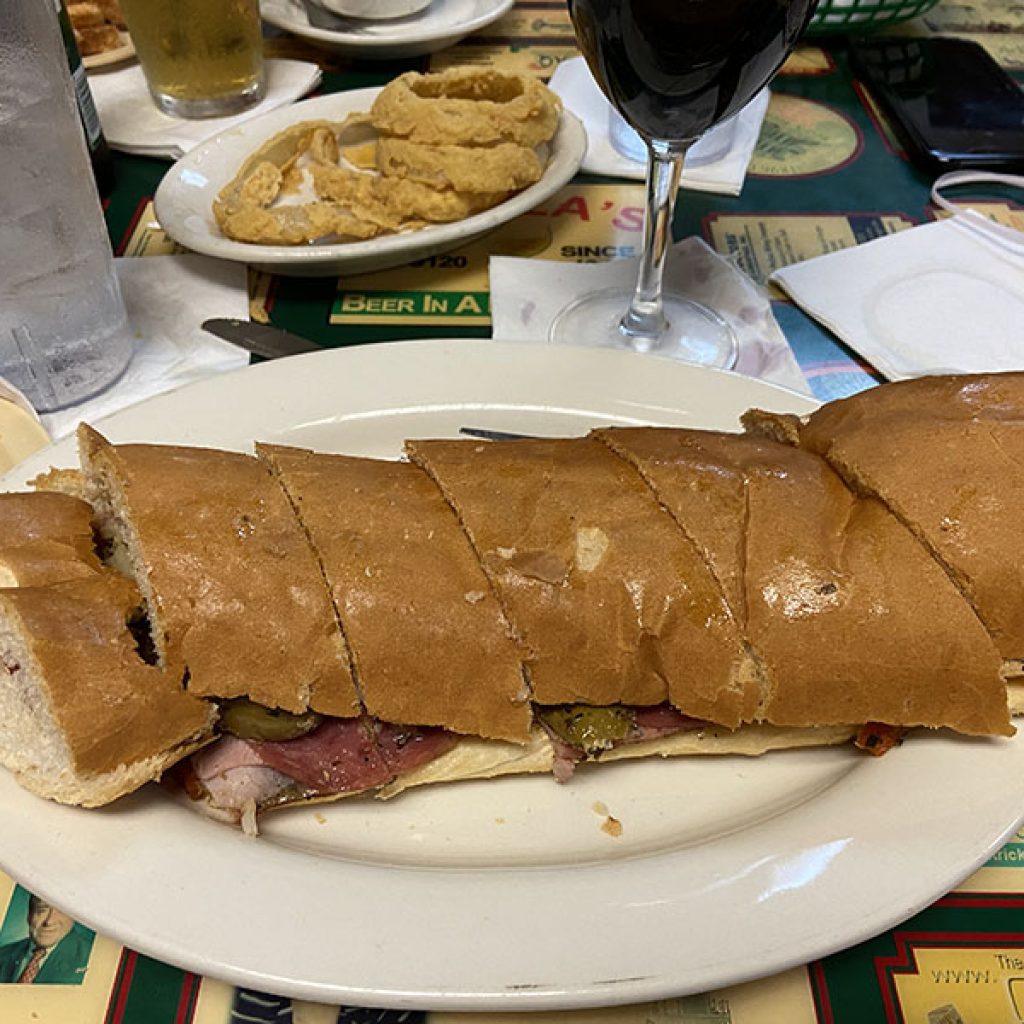
The best sandwich I had the whole time we were there was at an old (as in, it has been there forever) Italian restaurant, Liuzza’s by the Track. That’s where I had the Walter-recommended Frenchaletta, their take on the traditional muffuletta, only made on a really good French baguette instead of a round bun. The baguette was really good — crusty on the outside and tender on the inside. Liuzza’s olive salad was the best I’ve ever tasted. It was tart and slightly crunchy and the perfect foil to peppery salami and sweet ham. They cut the sandwich into six sections, and by the time I’d finished two, I was done. Walter had lunch for the next day — and a midnight snack, too!
Besides the food, the highlight of our visit to New Orleans was the World War II Museum. Hubert’s doctoral dissertation and first book dealt with World War II, and Lesa’s youngest son Eric had given the museum two thumbs up. Eric had told us we’d need three days to see the whole thing. I think he underestimated. After one day at the museum and only seeing the European theatre exhibits, I think it would take closer to four or five.

This statue group of a preflight briefing tells the story of World War II pilots preparing for another sortie. Staff photo by Debbie Reddin van Tuyll 
The WWII museum’s tribute to President Franklin D. Roosevelt.
Lesa and I learned a lot about the war in Europe. We entered the exhibit area via a train car where we saw an introductory film about the causes of the war and its effects on the home front. Each exhibit section also had an introductory film that helped contextualized the displays. Hubert found the museum to be pretty accurate in its portrayal of the war, and he’s looking forward to getting back so he can see the section on the war in the Pacific.
When you exited the train car and headed for the various displays, you had the opportunity to pick up a card that features someone who fought in Europe. You could check in at a station in each exhibit to find out what that soldier or sailor was doing during the battle explained in the exhibit. I had a young Native American boy. He and his brother joined the Army together, and their mother was able to get a pledge from the Pentagon that the two brothers would be able to serve together throughout the war. They had to force the issue a time or two, but they spent most of the war fighting together. I found that personal aspect of the exhibits so moving. We’ll definitely go back before Walter finally retires this fall.
We just spent one night in Memphis, but I got Hubert willingly to Graceland. He enjoyed seeing Elvis’ house, but he really liked the museum of all The King’s cars — except for the missing De Tomaso Pantera sports car he shot up — more than once. I hadn’t heard that story before and still don’t really understand what happened, but Hubert had a good time.

The Peabody ducks enjoy their afternoon swim in the hotel’s lobby fountain. 
Graceland, where Elvis Presley lived from 1857 to 1977. 
Elvis’ pink Cadillac.
We checked into the Peabody after Graceland and, well, frankly, we took a nap. We were exhausted, and we wanted to be well rested for our evening with our friend Joe Hayden and his wife Gloria. That meant we missed the ducks parading outfoxed the fountain and back to their rooftop homes, but we got to see them swimming in the fountain. The room and the bed were so comfortable, we had no trouble napping. Both were decorated in white and royal blue. I was a little disappointed that they’d replaced the duck-shaped soap with plain rectangular soap with a duck embossed on top.
Later, we met Joe and his wife for drinks in the lovely Peabody lobby. We’ve known Joe since our first teaching jobs at Union College in Barbourville. Think an Appalachian version of Paine College—small, poor and Methodist. Joe, a Barbourville native, had just finished his master’s at Missouri when he joined the Union faculty and was home figuring out his next steps. He taught journalism with me at the school.
MORE: Augusta and Thomson in Line for State Grant Money
We really enjoyed meeting Joe’s wife. I’ve run into him through the years at conferences, and we even co-authored a book once, but somehow, I’d never had a chance to meet Gloria. She’s wonderful. She’s witty, well-traveled and insightful. We had the best time getting to know her and laughing about our Barbourville memories and various travel exploits through the years. They’d spent their honeymoon in Ireland, so we were able to compare notes. We couldn’t have had a better last-night for our trip.
Our road trip was a perfect way to begin our retirement from the university. I was able to travel back to a place and time where I got started on the career that brought me to where I am today; I have come full circle from Fairhope to Augusta and back. I had a chance to reconnect with friends I have seen in years and revisit some spots I haven’t seen since I was a child. That’s the magic of a road trip that lets you travel across both space and time. I have come so far in my life and my career, and I am grateful for the opportunity not just to revisit my old haunts but also for the opportunity to tour my home territory.
Debbie Reddin van Tuyll is a writer for The Augusta Press. Reach her at debbie@theaugustapress.com.
[adrotate banner=”45″]

